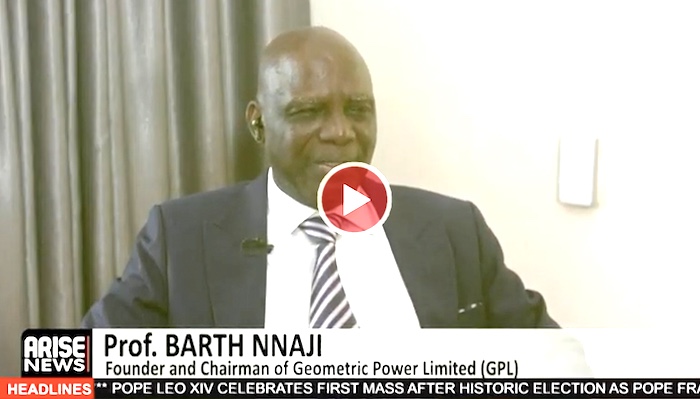BREAKING: Barth Nnaji: Effective Implementation Key to Nigeria’s Power Growth, Renewables Aren’t The Immediate Solution

Founder and Chairman of Geometric Power Limited (GPL), Barth Nnaji has called for pragmatic implementation of Nigeria’s new National Integrated Power policy, emphasising that while the policy framework is promising, its success hinges on effective execution and strategic investments in power generation, transmission, and distribution.
In an interview with ARISE NEWS on Friday, Prof. Nnaji expressed cautious optimism regarding Nigeria’s new national integrated power policy.
He noted that while the policies appear promising on paper, the real challenge lies in their implementation.
“All the policies are intended to be good, but it’s about implementation that really matters,” Nnaji remarked.
“For me, the growth of power in Nigeria is critical. The amount of power we have installed is nowhere near what we should have for the nation.
“As long as the integrated power initiative is delivering on increasing power availability aggressively, then we are making progress.”
Nnaji highlighted that the policy aims to enhance transmission infrastructure and improve the performance of distribution companies through increased investment, an idea that was initially proposed during the privatisation phase.
Addressing the potential of renewable energy, particularly solar power, Nnaji expressed reservations about the immediate feasibility of banning solar panel imports.
He noted that the country lacks sufficient capacity to locally produce the required panels.
“Do we have the capacity to produce solar panels to support what we need in the nation? I’m not sure we are there yet,” he said.
“We are probably in a transition period. While solar energy and other renewables are important, they may not be the immediate solution.
“We have an abundance of natural gas, and we should capitalise on it to build power plants, while also encouraging the construction of solar plants.”
Nnaji cautioned against abruptly stopping the importation of solar panels, suggesting that it might inadvertently spur local production but could also hinder immediate power solutions.
“The idea of producing what we consume locally is important, but we need a transition period to get there,” he added.
Nnaji further noted that the distribution companies (DisCos) must upgrade their infrastructure to ensure reliable power distribution.
He pointed out that many DisCos cover overly large areas, sometimes spanning four to five states, which hampers efficient distribution.
He advocated for the creation of smaller DisCos or franchisees to foster targeted investment and power uptake.
“It is critical that we understand that DisCos being creditworthy in power uptake will lead to better investment in the sector,” he explained.
“If we want more GenCos to emerge, the DisCos must be creditworthy enough to pay for the power they distribute.”
On financing, Nnaji urged the federal government to reconsider earlier policies that provided guarantee instruments for investors in power generation.
He expressed doubts about state governments’ ability to offer similar guarantees to encourage regional power projects.
“The transmission infrastructure we have now cannot carry the required power for the nation. We need at least 100,000 megawatts of available, not just installed, power in this country,” he stressed.
In conclusion, Nnaji reiterated the need for comprehensive discussions on financing, generation, and robust distribution.
He emphasised that achieving Nigeria’s power goals would require collaboration between the government and private investors, underpinned by pragmatic and sustainable policy implementation.
